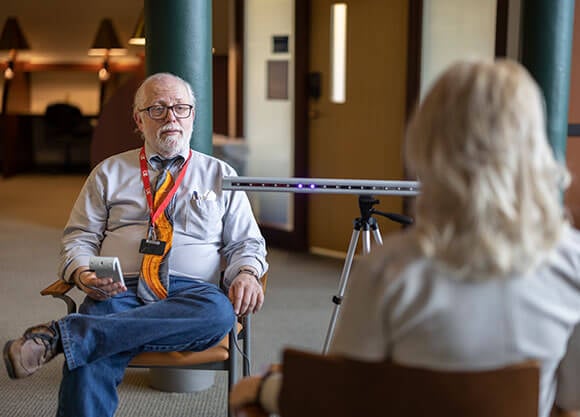
Graduate students, therapists, mental health clinicians tap into new ways of healing
May 12, 2022

May 12, 2022

The university hosted the first of two parts of EMDR (Eye Movement Desensitization and Reprocessing) Basic Training earlier this month. The therapy is a specialized, evidence-based approach to counseling to help clients heal from traumatic, negative, or stressful life experiences.
Two dozen graduate students and others who have a degree in mental health participated in a three-day program as a partnership between Quinnipiac and EMDR Training Solutions that involved lectured instruction and hands-on experience with role-playing to learn how to use EMDR to lead clients to overcome trauma.
Through a grant, the Quinnipiac MSW program offered 10 Black and Brown clinician fellows EMDR training for free with the intent to help get the specialized therapy to clients in need like the communities they serve in New Haven.
Licensed Clinical Social Worker (LCSW) Donald deGraffenried, who led the training, explained that difficult and traumatic memories can become stuck in the rear of the brain. While the psychotherapy treatment has been used for 50 years in the form of hand-tapping and audio stimulation, EMDR Basic Training now uses flashing light bars for the eyes to follow, which has been successful in beginning to identify and assess traumatic memories.
“The key is in the eye movement,” he said. “This is like mental health’s equivalent to brain surgery. It is an additional tool that can be used, either in place of or in addition to talk therapy, that helps clients overcome traumatic incidents.”
EMDR therapy has traditionally been used to help people recover from traumatic life events and Post Traumatic Stress Disorder and can be successful for children, teens, or adults that have had negative experiences and describe feeling stuck, anxious, irritable, or have physical health problems despite treatment.
“The light image shrinks PTSD and reduces physical distress associated with the traumatic memory. It is successful in some situations where talk therapy could be more distressing,” deGraffenried said.
This type of therapy can bring the most results in a rapid manner, he said.
“People can be trapped in their trauma,” said Reggie Harris, who trained the group of clinicians of color. “Unlike talk therapy, the brain is being healed through EMDR. By nature, the brain wants to blame the patient for being weak or not worth living. This therapy helps with those emotions.”
Harris explained that now more than ever is a great time to learn this technique.
“2020 left a mess – there was a tremendous amount of trauma and now there is a tremendous amount of need for therapy,” said Harris.
Quinnipiac Today is your source for what's happening throughout #BobcatNation. Sign up for our weekly email newsletter to be among the first to know about news, events and members of our Bobcat family who are making a positive difference in our world.
Sign Up Now